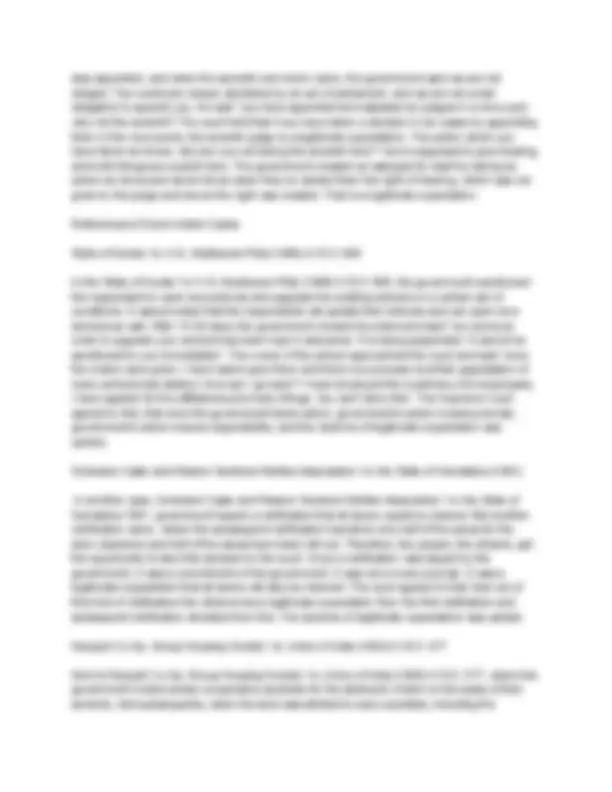





Study with the several resources on Docsity

Earn points by helping other students or get them with a premium plan


Prepare for your exams
Study with the several resources on Docsity

Earn points to download
Earn points by helping other students or get them with a premium plan
Community
Ask the community for help and clear up your study doubts
Discover the best universities in your country according to Docsity users
Free resources
Download our free guides on studying techniques, anxiety management strategies, and thesis advice from Docsity tutors
This lecture note will provide a clear idea on Doctrine of Legitimate Expectation.
Typology: Lecture notes
1 / 5

This page cannot be seen from the preview
Don't miss anything!




Doctrine of Legitimate Expectation Introduction This doctrine is the latest and freshest addition as a ground of judicial review of administrative actions. It has recently been invented in the last part of the 20th century and added to the armoury of the judiciary, and another check has been found on the executive that administrative action can be challenged. What are legitimate expectations? For a minute, if we forget legitimate, then what is an expectation? Expectation is a desire, is a wish, or you can expect anything, but in law, we can’t say that we are expecting anything from the government or from the state and it has been fulfilled, and if it has not been fulfilled, we say this is our expectation which has not been fulfilled. But it is a legitimate expectation. A legitimate expectation means which has some genesis quota of law, which is supported by rationality, by some law. It may be against the law, but there are some precedents, there is some custom, there is some practise in which it has its roots, and some citizens demand it. Yes, my expectation will be fulfilled because it is based on your practice, on your previous decision, on custom, or any other example the person can quote and say do this for me as well. There may be law, there may not be law, but yes, it is a legal right because it has been generated out of the legitimate actions of the government. It is the actions of the government that have given the expectation to a person, otherwise the expectation has no ground to stand on. But when it is legitimate, it depends upon the action of the government. Then it is a right, basically. We can compare it to the expectations of a surgeon. The surgeon knows that the patient on the operation table has no hopes, mere expectations, if not legitimately grounded on some practice, then it can be the expectation of a surgeon on whose operation table a patient is lying, and the surgeon knows that with his own expertise, his medical knowledge, and whatever scientific aids he has, he can’t save the patient. What was his intention? His intention is always to save that patient, and most of the time, that surgeon succeeds. And that is what we say: if the government’s action has been taken in a particular direction, then the respondent, the citizen, is demanding that whatever you have done in the previous case, do it with me also. If you can’t do this, then I shall be given a hearing. I should be heard, and after that, you site legitimate reasons, and then it can happen. We can say this legitimate expectation is being grounded on the doctrine of estoppel because the government has taken some positive action in a previous case, and when it comes to the next respondent, the next citizen, the government says no, the government is bound by its own actions. Legitimate expectations arise only out of the practice of the government. So, the government has taken a particular decision. Take that decision, in my case, the government is bound by estoppel. You can’t differentiate me. You can’t discriminate against me. So, estoppel is a part of legitimate action. The other part is, yes, the government is free to change the policy because the government has many considerations. The government has sympathetic consideration. The government has security considerations. The government has privacy considerations. The government has many considerations. So, the other part of the legitimate expectation is hearing. If the government wants to deviate from its previous decision, then the government is obliged to give a right of hearing to the person whose right is now being denied by the government. That citizen, that respondent wants to know that why my right has been denied, that come out only when right to hearing is being given. So, such is the case in the
legitimate expectation, which is grounded only on the actions of the government and a right has been given even there is no law specific law to address the grievance of a particular citizen but he can make out his case on the past practice. Thus, the government is bound by estoppels and the other is a right to hear, is a fundamental right to hear me and then deny me. If these two components are not being made, then a new right has been emerged, that is known as the legitimate expectation. British Practices In England in the year 1969, when this doctrine was emerged by the House of Lords, then there were two three practices; two three events which have taken place: (1) There was a long-standing benefit which was given to the dairy farmers. Government withdrew that benefit without giving them a hearing. Then they were on strike, and then their strike stretched for a long, government started taking action. In the meantime, they approached the court. The court came out and said that, one, if the benefit is being given to them, it is being withdrawn. Maybe it is a government policy, but the farmers should have been included in the process of decision making, which has not been done. It is their legitimate expectation to continue with the same. Yes, we can change our policy, but they must be involved and given a hearing.
petitioners; the principle of seniority was missing. It was challenged immediately as the cooperative societies applied only by taking the government notification seriously. Their seniority has not been considered. The government’s allotment subsequently was annulled by the court and the doctrine of legitimate expectation was upheld. Supreme Court Advocates-on-record Association & Anr. Vs. Union of India (1994) In this case, All Chief Justices of the High Court should be considered for their elevation to the Supreme Court on the basis of their seniority. But it was not considered and it was challenged saying that once a seniority list is out, all the High Court judges have a legitimate expectation to be considered for the post of Chief Justice of a High Court. Once they are being elevated to the Chief Justice of the High Court, all the Chief Justices of the High Court have a legitimate expectation to be considered to be appointed or to be elevated as a judge of the Supreme Court. Uma Shankar Paliwal Vs. State of Rajasthan (2021) In this case, the mining licence was granted to the petitioner for 20 years by the government of Rajasthan. For 20 years, the petitioner will continue to be mining in a particular area with all terms and conditions whatever they are. But after two years, there was a change of government. And once there was a change of government, the new government reconsidered the decision for 20 years and said that they were reducing it from 20 years to 10 years. Then, immediately, the petitioner approached the court and said “I have purchased the machinery, keeping in view my 20 years’ licence for mining. I have employed people. I have engaged my whole machinery according to this and reducing the period in between is hitting my legitimate expectation because it was given only by the government and now the government has taken the defence”. The Court agreed to this and the doctrine of legitimate expectation was upheld. Limitations The doctrine of legitimate expectation has its importance, its use and it has been exercised in India. But at the same time, it has its own limitations. What are the limitations? (1) If there is a legislative enactment, the doctrine of legitimate expectation has no place. Let me illustrate it through the case of the State of Himachal Pradesh versus KC Mahajan,1992. Here, it is a case of the retirement of an official and when it comes to the retirement, the age of the retirement as per the Constitution is to be fixed by the government. It is not a matter of right. So, when the respondent had to retire, his retirement age was reduced by the government and he was made to retire. It was challenged and the court said “you can’t do it with any particular individual”. But subsequently, the government took the matter to the legislature and the HP Vidhan Sabha passed an act where the age was fixed to 58 years. Now the legitimate expectation comes to an end. There is a clear-cut law; there’s a law in black and white; there is a positive law; a law in writing; legitimate expectation cannot operate against the legislature because the legislature has passed the law.
(2) There is another exception to this i.e., public policy. We have a public policy. According to the public policy, there is a standard of morality and a standard of decency in society. If anything goes against public order or public policy, it cannot be allowed. (3) Another exception we can take is the National Security. If some action is being taken by the government to protect the borders, the national security, and the defence of the country, that cannot be taken as a legitimate expectation. The government is expected to act in such matters promptly and exceptionally. Conclusion We know that we have our own political executive. The head of the political executive is the nominal executive as President of India, and the working executive is the prime minister of India and the Council of Ministers, and that is subject only to five years. So therefore, we say the head of any executive ministry is a minister; they change and once they change, there is a change of policy. So, most of the time shelter is being taken behind the change of policy, but change of policy again requires, the right to be heard with the person whose legitimate expectations are hit. So, if there is a justification for the change of policy, the government has to say that yes, there is a change of policy. The policy was earlier this. And now the policy is that if there is a change of circumstances, not change of individuals, not change of ideology, not change of a political party, that has to be changed in the circumstances and under the changed circumstances, which has to be proved by the government. The change in the decision can be there, but by giving a right of hearing to such person whose rights are being affected. This legitimate expectation is a right but it can only be exercised when we say that the people who are involved in the administration of public institutions are well aware of this right and, at the same time, the citizens who are meek, humble, and poor are on the receiving end when they visit any office for their own work. Then, unless and until they are supported by the administration, they are supported by the policy; their grievances cannot be redressed. So, legitimate expectation is a tool which is being recognized by the court to strengthen the citizens. It can only be successful when the government officials take it in the right perspective and it reaches the citizens in the right perspective. Thank you very much.